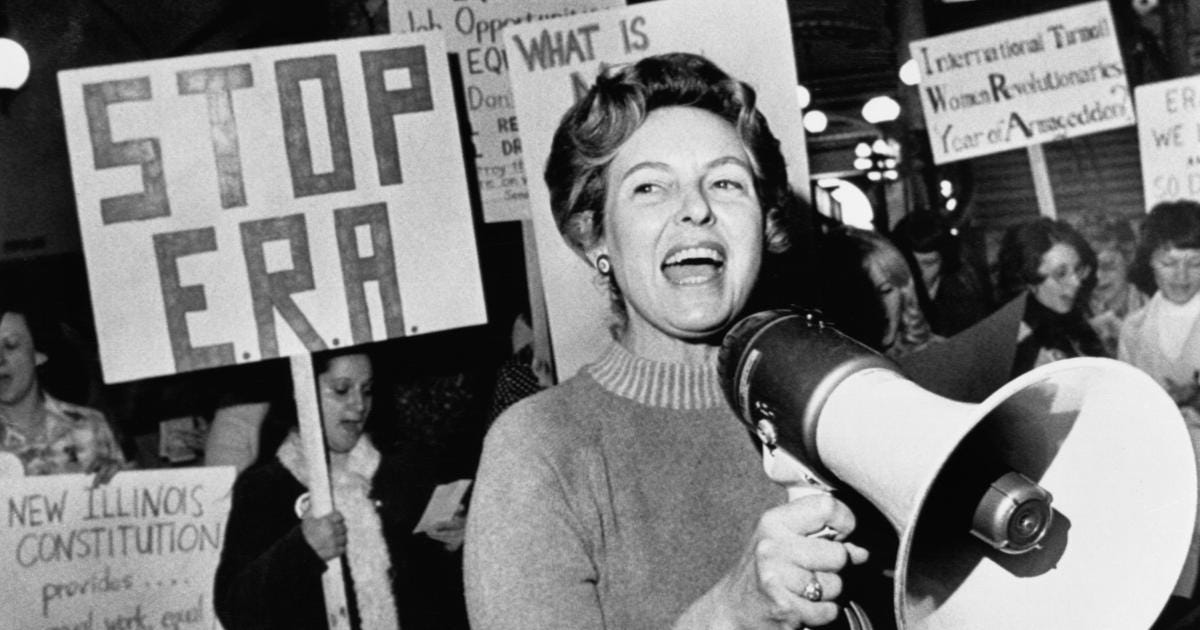Spare your time and mental health. Reclaiming is a weekly feminist roundup with all the essential highlights and action items you need to stay informed without the *chaos* of mainstream media.
Moms for Liberty, the far-right organization whose women members have portrayed themselves as protectors of America’s schoolchildren against “groomers,” are back in the news after an outreach coordinator who works with its Philadelphia chapter was revealed to be a convicted child molester. And every time I see photos of their angry faces, I am plunged back into a deep research rabbit hole about why women vote (or engage in activism) against their interests.
53% of white female voters elected Tr*mp in 2016, and up to 55 percent of white women voted for him in 2020 (compared to 90 percent of Black women voters who supported Biden, along with almost 70 percent of Hispanic women.) A Wall Street Journal poll last year found that white suburban women favor Republicans in congressional races by 15 percentage points. Although the 2022 midterms and elections since the Dobbs decision show a promising influx of new women voters, the anti-feminist voting bloc remains a long-standing, ugly truth that we have to face every single election cycle.
But how did they get there? With Republicans so explicitly and unapologetically advancing an anti-woman agenda - and so many tech/communications advancements improving our ability to learn about their unethical ways - why do (mostly white) women still vote against their own interests?
In the early 2000s, I grew up in a ruby-red suburb of Sacramento and went to high school/church with mostly white, rich kids who were deeply conditioned with Bush-era conservatism. I was skeptical about what I was taught, i.e. that Gloria Steinem was actually the devil and that feminism was a bad word. But every time I questioned these lessons, I was punished or shot down by authorities. I quickly learned how to fall in line. When I turned 18, I dutifully registered as a Republican like all my friends.
During my first semester of college, I found a spark in myself I’d never experienced before in my political science classes. When I realized I couldn’t debate my peers because none of my “opinions” really held up under scrutiny, I began watching Fox News for talking points. (I know, I know. Stay with me.) I parroted its language about gender roles and how the Dixie Chicks were anti-American, even though it never felt right. But beyond my inability to form my own coherent arguments, I simply couldn’t make sense of the canned conservatism of my adolescence and my real, diverse experiences outside of that red suburb.
A socialist, draft-dodging hippie professor at UC Davis finally broke the spell. During the time I spent in his Comparative Literature seminar, I re-registered Independent (I’d eventually register as a Democrat, which I still am today) and I ghosted the College Republicans. I threw out all the T-shirts and posters and chucked all the Ayn Rand books. I started the deep, painful work of unlearning the ideology I had absorbed. After a couple of years and lots of support from new friends, I fully deconstructed my conservative beliefs.

Now, my story took place twenty years ago (woof), and I’ve been progressive longer than I was conservative, but I share it because it directly parallels those of the conservative white women who make up a huge portion of the electorate.
Let’s compare some of the main causes why women vote against their interests, as identified by political scientists, to my story:
They experience internalized misogyny. I was conditioned to believe that I couldn’t make rational decisions because my hormones made me unstable; therefore, I absorbed the ideology of the men in my community without question. Internalized misogyny takes many forms, but is generally defined as when women subconsciously project sexist ideas onto other women and themselves, usually as a result of conditioning from their environment.
They aren’t directly affected by institutionalized sexism.* This one has an asterisk, because I mean they don’t think they’re directly affected. For example, as a privileged white woman in the suburbs, I wasn’t exposed to gender inequality in business/professional fields, so I wasn’t bothered by it, or I flat-out denied it existed. Similarly, there was very limited diversity in my environment, so I wasn’t exposed to the harms of racism/classism first-hand.
They are manipulated by the media. Easy - Fox News is propaganda. Next.
They face peer pressure to fall in line. All of my close friends were registered Republicans and reinforced my views on a daily basis. I see this point as the main reason groups like Moms for Liberty exist - conformity becomes paramount to authenticity.
They are protecting their power and status. This doesn’t relate to my story, but I encountered it all the time as a young conservative: if a woman says she votes Republican for economic or “national security” reasons above all, I tend to think this is the underlying reason.
You may know a woman or two (or more) that fall into this “women-voting-against-their-interests” category. How do we reach them when we need them?
It is unbelievably hard to admit you’re wrong if you’ve held these views for a long time, especially if it has become your identity. Leave plenty of emotional space and support for this hard truth.
Ask her questions that clarify her point of view. Don’t antagonize, just ask and keep asking. From experience - when people questioned me, my beliefs unraveled quickly.
Be graceful if and when she realizes her beliefs are unraveling under scrutiny. People are allowed, and should be encouraged, to change their minds.
Know when to push harder and when to give up. Some people will not change. Don’t waste your valuable energy on a losing battle.
That’s it for this week, my loves. Take care of yourself, drink water, be kind, and have a good Full Moon in Gemini tonight.
Until next week, I love you-
Sarah
Witch of the Week
Rosalynn Carter
The former First Lady passed away earlier this month. Her legacy is often muddled with her husband’s oft-criticized, single-term presidency, but she was a force all on her own. As First Lady, Mrs. Carter advanced an impressive, before-her-time mental health policy agenda. She was so aggressive with shaping the Office of the First Lady and the East Wing into a fully functioning policy role, in fact, that a Newsweek columnist at the time referred to her as “Mrs. President.” Rest in peace Rosalynn, thank you for your service.
Rec of the Week
“It’s easy for land acknowledgments to become yet another form of optical allyship. They often lack a call to action and next steps. Without these components, land acknowledgments are just empty words. They become an excuse for folks to feel good and move on with their lives without actually contributing anything to the community. As President Robert Larsen of the Lower Sioux Indian Community puts it, ‘An apology or an acknowledgment is one thing, but what are you going to do next?’"
Feminist News Bulletin
President Biden launched the first White House Initiative on Women’s Health Research, which will be led by Dr. Jill Biden and the White House Gender Policy Council.
Seven other women joined a lawsuit over Texas’s abortion laws, arguing that the state denied them abortion care and endangered their lives.
The Oklahoma Supreme Court reaffirmed that the state constitution protects the right to abortion in life-threatening situations.
The premature birth rate in the US remains exceptionally high, a report from the March of Dimes found, with almost no change from the previous year of reporting.
Vice President Harris announced a $900 million pledge to boost women’s global workforce participation in green sectors, including clean energy, fisheries, and environmental conservation.









